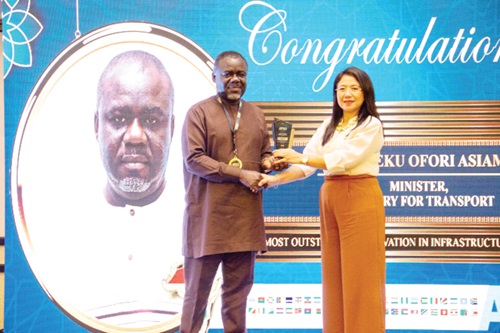The Minister of Transport, Kweku Ofori Asiamah, has urged Africa to unite and build a more robust public transport system to facilitate smooth operations to reduce the burden placed on commuters by transport operators.
He said the lack of adequate public transportation systems was a pressing issue plaguing the transport sector in Africa, attributing the challenge to insufficient infrastructure.
That, he stated, could be addressed through legislation and regulation, emphasising their crucial role in preventing transport operators from overburdening commuters with exorbitant fares.
Award
Mr Asiamah made this remark during an interaction with the press after receiving the 'Most Outstanding Innovation in Infrastructure Development' Award at the 2024 African Public Service Optimum (APSO) Conference and Awards night in Accra.
“We need to establish legislations and regulations to ensure that commuters are not exploited by transport operators. This doesn't mean transport operators don't deserve fair compensation, but without regulation, they may overcharge our people," he emphasised.
The event, which was on the theme: "Transforming Africa through public service professionalism and excellence," was to recognise outstanding public institutions and public servants who have demonstrated excellence in delivering public goods and services.
It also sought to foster cooperation and working relationships among award-winning institutions and public officials across Africa. In attendance were ambassadors, ministers, traditional rulers and diplomats from across the continent.
Striking balance
Mr Asiamah further emphasised that unregulated transport operators may exploit passengers, leading to selfish manipulations that drove up the prices of essential goods and services.
He cited the Matatus (commercial public minibus) industry in East Africa as an example, where safety and affordability were significant concerns. The minister stressed the need for African governments to strike a balance between allowing transport operators to earn a fair income and protecting commuters from exploitation.
By implementing laws and strengthening institutions, Africa could build a more robust public transport system, Mr Asiamah stated, while acknowledging that not everyone could afford private vehicles.
That move, he clarified, was not an anti-transport operator but rather a call for empathy and understanding for the continent's economically vulnerable populations. "By prioritising commuter welfare and safety, Africa can work towards a more equitable and sustainable transportation sector," Mr Asiamah stressed.

